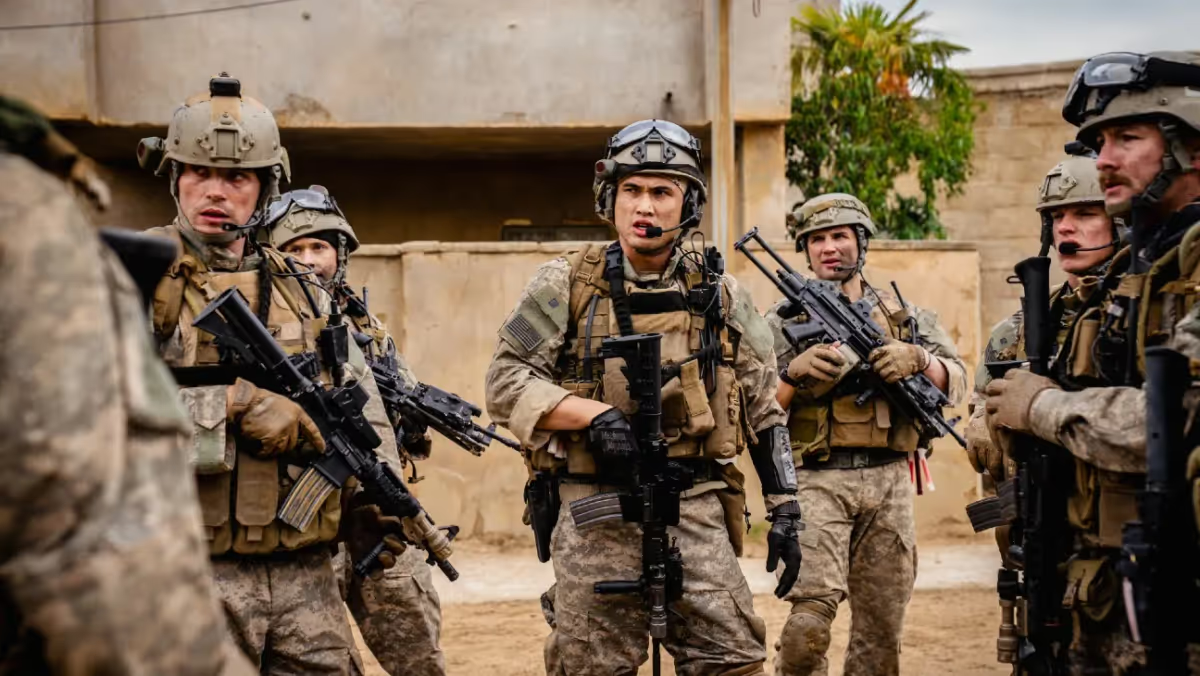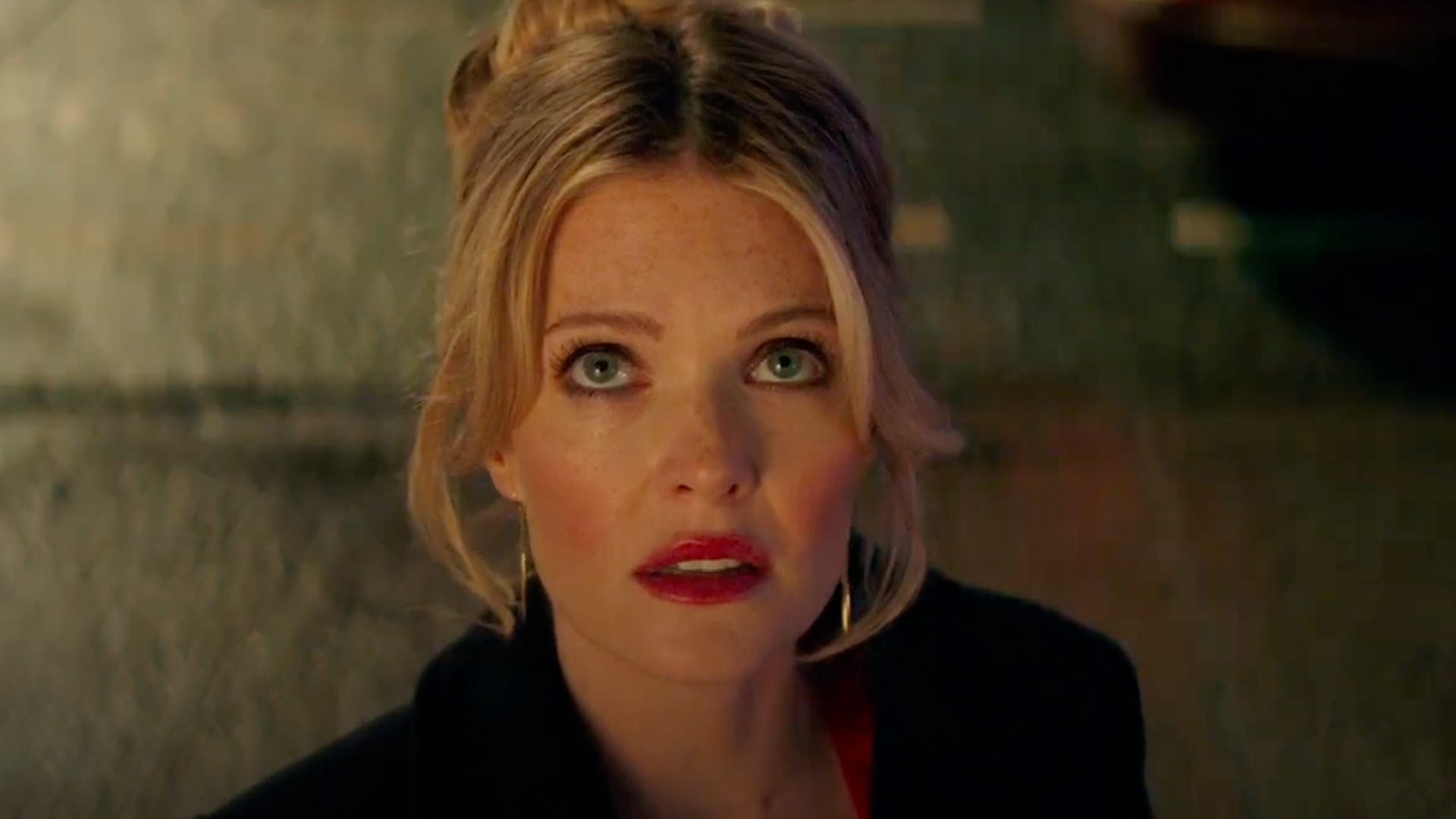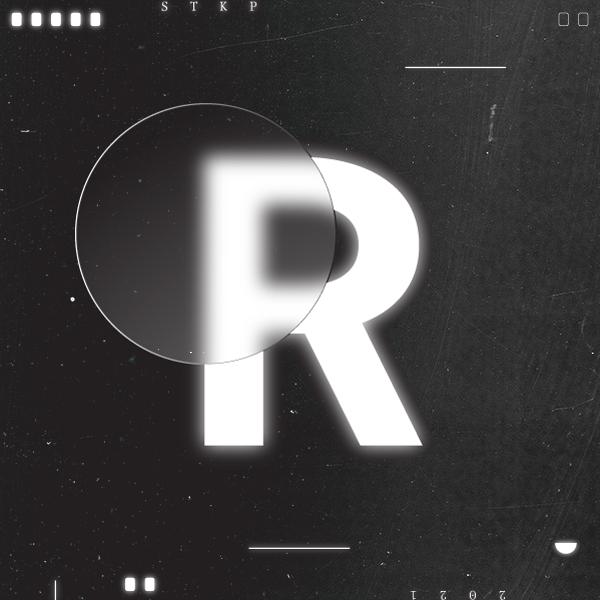In Review: 'Warfare,' 'Drop,' 'The Amateur'
This week, Alex Garland heads into battle (again), Meghann Fahy has a rough first date, and Rami Malek leaves his desk job at the CIA.

Warfare
Dir. Ray Mendoza, Alex Garland
95 min.
There’s an old combat adage dating back to World War I that describes war as “long periods of boredom punctuated by moments of sheer terror,” but anticipation can be a terror in itself, especially when soldiers are stuck in a vulnerable spot. That’s the impression left by Restrepo, the great 2010 documentary by Sebastian Junger and the late Tim Hetherington about American troops stationed at an outpost in Afghanistan’s Korangal Valley that made them daily target practice for insurgents. That same dread-soaked unease creeps into the early scenes in Warfare as a platoon of Navy SEALs commandeer a two-story residence in Ramadi, Iraq in November 2006 to set up a sniper’s nest. They’re eyeing possible jihadis, but if the target shoots first, they’re sitting ducks.
Based on a real-life event experienced by first-time filmmaker Ray Mendoza, who shares a writing and directing credit with the more seasoned Alex Garland, Warfare could be likened to an experiential film like Black Hawk Down, another story of military specialists fighting for survival in hostile urban terrain. But there’s a pared-down aesthetic to Warfare that feels both more authentic and less exploitative, because it’s so penned into the parameters it defines for itself. We may be a little too accustomed to seeing war movies that approach the politics of a conflict with blinders on, but the narrow perspective of Mendoza and Garland’s film is its greatest distinction. It’s about men getting into a harrowing situation and scrambling desperately to get out of it. That’s all. And that’s plenty.
The Reveal is a reader-supported newsletter dedicated to bringing you great essays, reviews and conversation about movies. While both free and paid subscriptions are available, please consider a paid subscription to support our long-term sustainability.
There is no main character in Warfare, just the platoon of Navy SEALs, a handful of Marines who swoop in for support, and the terrified Iraqi family that huddles together as their home gets bombarded. Only two of the troops are referenced by their real names, Mendoza (D’Pharaoh Woon-A-Tai), who does communication, and Elliot Miller (Cosmo Jarvis), the tobacco-chewing lead sniper. The other roles are filled out by capable young actors who are recognizable up-and-comers (Will Poulter, Joseph Quinn, Charles Melton) or relative unknowns. The characters are developed only as far as they need to be, but Mendoza and Garland have smartly banished any backstories or unnecessary color. The language tends to be technical and tactical, with occasional punctuations of agony.
Suffice to say, the sniper’s nest comes under attack, starting with a grenade popped quietly through a hole in the building’s facade. So much of Warfare is defined by what it doesn’t do, but that only accentuates what it does do, which is to live up to its title. Though verisimilitude is a paramount value here, Mendoza and Garland show real artistry in handling the key moments, including an IED bang that’s as effective a jump scare as you’ll ever experience, in part because of the hushed longueurs that precede it. The sound work in the film is perhaps its most effective weapon, because silence is such a crucial part of it, whether the platoon is waiting nervously for the next shoe to drop or a moment of terror is drawn out in slow motion. The haunting final shots hint subtly at the larger critique of the war, but Mendoza and Garland devote themselves simply to showing what it’s like and their minimalism is bracing. — Scott Tobias
Warfare is opening in theaters everywhere this weekend. Worth seeing in large-format if possible.


Drop
Dir. Christopher Landon
95 min.
In the early scenes of Drop, a new thriller directed by Christopher Landon (Happy Death Day, Freaky), it’s clear that Violet (Meghann Fahy) badly needs a win. She seems well settled into her life as a single mom and caring therapist, but only after the film opens with oblique flashbacks to the sort of traumatic event that no one recovers from quickly or easily. Violet has come to specialize in patients recovering from abusive relationships, but it’s clear she’s not all the way to the end of her own journey in this process. A good night out might be just what she needs. Too bad it’s not what awaits her.
Much of Drop takes place in Palate, a haute cuisine restaurant overlooking the Chicago skyline. It’s a restaurant that prides itself on offerings like “coconut calamari,” and the sort of place one goes if they want a first date to be special. The night’s been a long time coming. Violet’s been trying to get out there a bit, slowly, chatting with Henry (Brandon Sklenar), a professional photographer, on a dating app for months before finally agreeing to meet him in person. When Henry arrives, they hit it off. Then her phone buzzes with a series of threatening variations on popular memes. She tries to ignore them. What she can’t ignore is the security cam footage revealing a masked intruder in her home.
If you’ve seen the trailer for Drop (and avoid it if you haven’t), you have some idea of where this goes. What makes the film gripping is how it gets there. Unable to seek help, Violet is forced to do her best to avoid following her tormentors’ commands while simultaneously attempting to figure out who’s behind her night from hell and how to short circuit it — all without letting on that anything’s wrong to those around her. Is it the sympathetic bartender? The lecherous pianist? The waiter who seems to see his job as an extension of his improv ambitions? Henry?
Working from a script by Jillian Jacobs and Chris Roach, Landon effectively, if not always subtly, keeps the tension high. That effort gets a lot of help from Fahy’s finely calibrated performance. She plays Violet as a woman who’s always this close to falling apart but who knows she has to keep it together or lose everything she cares about. Landon has cited Wes Craven’s Red Eye as a major inspiration for the film, and its influence is unmistakable there, up to a finale that doesn’t quite live up to what’s come before. But when what comes before packs in so much well-orchestrated suspense and surprises, maybe that doesn’t matter too much. —Keith Phipps


The Amateur
Dir. James Hawes
123 min.
If the name weren’t already taken by a mostly forgotten Sylvester Stallone vehicle from the mid-‘90s, The Amateur might more accurately be titled The Specialist. The word “amateur” sets up expectations for a thriller that’s more intriguing and distinctive than the merely proficient one that James Hawes has directed. A revenge thriller executed by an amateur might look, say, like Macon Blair in Blue Ruin, carving a sizable gash in his hand trying to puncture a car tire with a cheap steak knife. Some of that desperation is present for Charles Heller (Rami Malek), a CIA cryptographer seeking to avenge his wife’s death, but at no point does he seem inept or even that uncertain, despite his inexperience in the field. His particular set of skills just never involve punching Eurotrash henchmen in the throat.
Though highly adept at engineering, surveillance, and unpacking codes and puzzles of all kinds, Charles labors five floors down at CIA headquarters in Langley and his agoraphobic tendencies make him well-suited to the job. He’s devoted to his wife Sarah (Rachel Brosnahan), but balks at the opportunity to join her in London for a business trip, because he’s more comfortable sticking to his routine. When Sarah is killed in a terrorist attack, a devastated Charles uses an abundance of video footage to identify three of the men responsible, but his bosses at the agency, chiefly the deputy director (Holt McCallany), are curiously reluctant to bring the suspects to justice. So armed with tech wizardry and a little assistance from a contact in Istanbul, Charles takes the law into his own hands.
As Charles weaves his way through mercenaries and CIA operatives, The Amateur blows a chance to distinguish him from his colleagues, who ostensibly have an edge in the field, but lack his technical acumen. While the film does plenty to emphasize his flair for piecing together visual puzzles on the fly—in one scene, he picks through the details of a single picture of a vineyard to pinpoint a specific region in Spain—Charles is also scrappy and fleet of foot, and able to slap together improvised explosives when necessary. In other words, he has no glaring weaknesses that might be exploited by his many adversaries, only areas of relative strength. And as played by the miscast Malek, his emotions are swallowed up by the remote, stilted, half-spacey delivery that’s been the actor’s stock in trade since Mr. Robot.
The supporting cast is character-actor paradise: McCallany and Julianne Nicholson as CIA brass at odds with each other; Jon Bernthal and Laurence Fishbourne as agents of questionable loyalty; and Michael Stuhlbarg as the Final Boss type waiting at the end of the line. All of them acquit themselves well, with Stuhlbarg especially shining in a one-scene wonder, and The Amateur itself is sleek and engaging, if a little bit colorless. Had the filmmakers allowed Charles to screw up a little bit more and reveal the foibles of a desperate man out of his element, the film might have gained more suspense or ragged humanity. As it stands, this amateur seems pretty damn good at the job. — Scott Tobias
The Amateur opens this week in theaters everywhere. It is a radical departure from the Hal Hartley movie.





Discussion